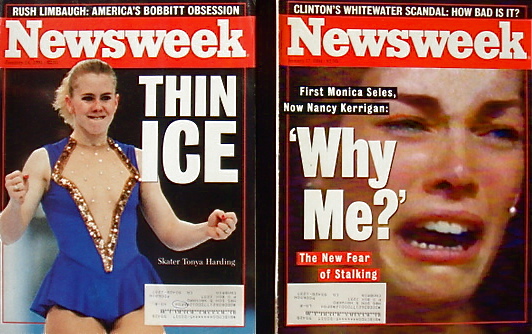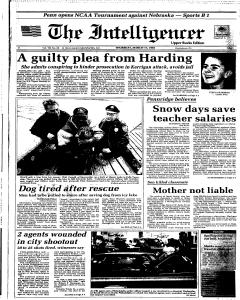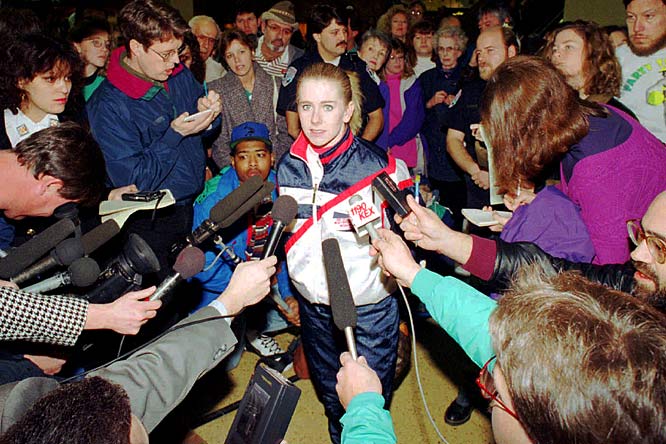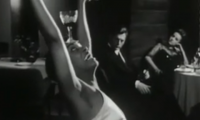maxthewonderpup, “Landing A Triple Axel During Warmup” (US Nationals, 1992)
I’m running late for my performance, lost in a maze of dark tunnels beneath the stands. I’m scheduled to appear in five minutes. I feel the cold air of the rink and go towards it. I’m just about there when I see Tonya Harding, circa 1992. She’s sitting alone on a bench crying. “Hey what is it,” I ask. She tells me her lace is too short and she’s going to miss her program. I sit next to her. “No, wait, don’t worry,” I say. I unthread the lace from one of my skates. She grabs it from me unceremoniously. I rub her back as she prepares her skate. “Oh that feels good, you’re sweet,” she says, and before standing up she kisses me, a little more than tenderly.
I woke up from this dream one morning, for whatever reason: the Lillehammer Olympics happened a long time ago and I only vaguely remember seeing Tonya’s shoelace disaster. I was with a friend in a busy pub in central London. I’d heard about the whole Tonya Harding-Nancy Kerrigan drama, unavoidably, and so had everyone else, which is why all these drinkers in London had their eyes trained to the television during a figure skating competition. As I recall, there were a few contemptuous groans when Tonya gave up and started crying.
genuinecap, “Tonya Harding Broken Shoelace: US Version” (Olympics, 1994)
That was the last performance of Tonya’s skating career. I never really gave her much thought after that. Then years later, I have this banal, erotic dream.
At first Google, I land at tonyaharding.com and discover I’m not the only one whose dreams have been visited by Tonya Harding. Her website includes a “fantasy page” where over 1650 people have posted descriptions of their Tonya fantasies. Example, from “55 year-old male,” pseudonym EchoFlash51:
“Before I know it, my lips meet Tonya’s. Our tongues dance together for what seems like an eternity… as if from a previous life they are reunited. Running my hand through her hair, holding her head in my hand, as we kiss deeply…”
Easy EchoFlash51, you’re treading on my subconscious… Most fantasies are a good deal less innocent. They include a lot of “trembling,” “gasping,” and “exploding.” Tonya is a mocking sadist or a vulnerable girl in need of comfort, and her “powerful thighs” play a part in almost every story. The site is endorsed by Tonya herself with an inept thanks-to-fans video recorded in 1999.
tonyaharding.com, “Thank You Message To All My Fans” (1999)
As far as I can tell, 1999 is the year when Tonya began to yield to the caricature created of her. Fine, I’ll be the trailer trash girl. Tell me your sexual fantasies… Her site even includes a link to the honeymoon sex tape she’d once tried so hard to suppress. In fact, in the years following her ban from figure skating, you see Tonya becoming evermore “herself,” or at least that person she was always accused of trying to conceal: the foul-mouthed, hard-drinking bad girl poisoned by the bitter resentments of poverty and an abusive childhood, the white trash chancer only truly at home in a pick-up truck or motel room with thugs and reprobates. Those run-ins with the law, for example — car accidents, drunk driving charges, unpaid rent — and those tumultuous relationships with dubious men: one boyfriend named Darren Silver went to the police with charges that Tonya had attacked him with a hubcap; the judge sentenced her to three days in jail and ten days of community service for domestic violence.
Then there are the bleak and desperate public appearances such as this community hall pro-wrestling event. You can hear Tonya — confederation t-shirt and all — call herself “a red-neck ho.”
communistcothern, “Boss Campbell v Tonya!” (Harrison, Arkansas, 2007)
Nancy Kerrigan has fulfilled her side of the equation as well, by remaining the goody two-skate ice princess. Since leaving competition, she’s created a foundation to raise awareness for the vision impaired, performed in ice shows, written a couple books, commentated countless skating events, and been inducted into the US Figure Skating Hall of Fame. In 2008, she was guest of honor at the Ice Theatre of New York benefit gala. And none of this has stopped her from creating a happy home for her husband and three kids. She’s become rich too. While Tonya was collecting her fistful of petty cash down at the wrestling ring in Arkansas, Nancy was recording a series of figure skating tips sponsored by the pharmaceutical company, Torpicin, looking like she’d just emerged from twelve years in a hyperbaric oxygen chamber.
torpicin, “Scratch Spin Tips From Nancy Kerrigan” (2007)
Judging from the YouTube comments, most people see the starkly divided fates of the two skaters as poetic justice: the good one prospered, the bad one suffered, divine order upheld. But look a little more closely at the whole story and you see the narrative requires a more nuanced moral accounting. True, the media and the public have been largely confirmed in their judgments, and the cartoon characters of Tonya and Nancy have been born out in reality, but let’s not forget the miraculous power of naming. We become ourselves under the gaze of others, as adjectives are affixed to the way we look and the things we do and say. Irresistibly, little by little, we play the role that is assigned to us, public figures most of all.
I suspect Tonya Harding would never really have been allowed to become America’s ice princess anyway, even if she had kept her head together and skated consistently after winning the 1991 US Nationals. You hear commentators talking constantly, and by moments almost apologetically, about the power of her body, understanding implicitly that in women’s figure skating overt athleticism is off-putting. What’s more, they’d always find her lacking in the artistic department.
yodabeesh, “Tonya Harding’s Career Highlight” (LP, US Nationals, 1991)
She’s the first American woman to land two triple axels in a single competition, yeah that’s great, but she’ll never conform to the delicate femininity advocated by the sport, still haunted no doubt by its days as a diversion for young ladies of the wealthy classes. How can you be an ice princess with blocky thighs and a manly butt?
Give us non-threatening Nancy Kerrigan, who talks with the tentativeness and innocence of a ten-year old, whose athleticism is concealed in a nice, slender body. With Nancy, the favored adjectives were “elegant,” “pure,” “graceful,” “weightless.” You can be sure the 55 year-old masturbators are not conjuring up Nancy Kerrigan in her chaste Vera Wang dresses.
Vera Wang, “Designing & Donating Nancy Kerrigan’s Skating Costumes” (1994)
I didn’t know that figure skating was a means of social ascension for Nancy just as it was for Tonya. She didn’t have an alcoholic mother, six-times remarried, who at practices called her “stupid scum” in front of her peers and smacked her across the head after weak performances, but she did have working-class parents who had to remortgage the family home and take out loans to keep their daughter in competition. She repaid them with unyielding gratitude and humble perseverance, finally pulling the family out of its blue-collar beginnings. Nancy would come to embody middle-class effort and virtue — in her clothes, her manner, her physical body — and she could even be dressed up to look credible in high-class fashions.
Tonya would never be asked to try the glass slipper. Unlike Nancy, she evoked the very real class distinctions in America’s supposedly classless society; she was a reminder of the unmentionable: the impoverished white underclass. And so her rise in the skating world was attributed to raw talent and ambition rather than hard work. The subtext early on was that she was merely dressing up and pretending, disguising trailer-trash calculation, brutality and laziness. Her later treachery merely confirmed what her powerful body had displayed in advance, popping, as it did, out of her tacky dresses.

Tonya and Nancy were players in class drama and moral pantomime all at once. They could not have been more perfectly cast. Tonya: tomboyish, stubborn, crude, tawdry, trashy. Nancy: pretty, obedient, polite, well-turned out, classy. Had Nancy emerged from a completely different social background, perhaps Tonya would have felt a less stinging kind of envy. When Tonya’s goon strikes Nancy on the inner thigh, he gets the world to think of the virginal ice princess down there.
The attack is described in this news clip as a “random” and “unexplainable” act of violence, then cuts away to as-yet-unidentified culprit, “91 National Champion, Tonya Harding” (2:52).
ABC, “Nancy Kerrigan Attack Detroit” (January, 1994)
With Nancy nursing her swollen knee and receiving the help and sympathy she cried out for, Tonya won the Nationals with a carefree skate that would have suggested that her conscience was clear. But it was only that she had got away with it.
Four days later, the police — weirdly enough — got hold of an audio recording of a meeting in which Jeff Gillooly, Tonya’s deadbeat ex-husband, offers $6500 to the friend of a friend to “disable” Nancy Kerrigan. Soon after the FBI interrogated Tonya for hours and then let her go. She immediately told the press that she was separating from Jeff, who was then arrested. Jeff joined the other three conspirators already in custody with a stunning declaration: Tonya had been an active participant in the whole plot.
All the while, the Lillehammer Olympics were approaching. Nancy, the wholesome face of Campbell’s Soup and Reebok commercials, was working hard to recover her form. Tonya, shamed by her possible involvement in the gong-show attack on Nancy and facing potential jail time, trained with less fortitude. When Tonya arrived at the Olympic village, she discovered that Jeff had sold their wedding-night sex tape to the media; the pictures were in every newspaper.
The Lillehammer women’s figure skating short program on February 23rd, 1994, had the highest ratings of any US TV broadcast in 11 years. Nancy wore the same white dress she had been wearing when she was attacked. Tonya came out in a sleeveless red dress and heavy makeup and skated to the music of “Much Ado About Nothing.” At the end of the night, Nancy was ranked first and Tonya tenth. Tonya’s crack-up happened during the free skate two days later. Her lace broke and the replacement given to her was too short. “It’s not gonna hold me!” She finished in eighth place, her feet never again to be bound in skates. Nancy got the silver medal, out-princessed by the balletic Oksana Baiul (whose childhood, incidentally, makes Tonya’s seem like a walk in the park).
 Tonya’s descent into ignominy had only just begun. Back home in Oregon she pleaded guilty to conspiring to obstruct prosecution of a case: three years probation, 500 hours community service, a $100,000 fine and an obligation to give $50,000 to a fund for the Special Olympics. “Perhaps the only good thing to come of it,” said Norm Frink, Deputy District Attorney, “is the realization by Tonya Harding that perhaps she has placed too much value on her goals and not enough value on herself as a person.” Had Nancy Kerrigan placed too little value on herself as a person as well? In all the hullabaloo, she let fall the public mask, first with acid comments about champion Oksana (“Oh, come on. So she’s going to get out here and cry again.”) and suggestions of bias on part of the judges (“I was flawless… [Oksana] two-footed two jumps.”) — betraying her own envy, not to mention a sense of entitlement. Worse, she disparaged one of America’s most venerated icons: standing next to Mickey Mouse, she was caught on camera saying “This is so dumb. I hate this. This is the most corny thing I’ve ever done.” For this she was severely admonished in the press. As the idealized half of the Tonya/Nancy monster, she could not be allowed to express dark human feelings.
Tonya’s descent into ignominy had only just begun. Back home in Oregon she pleaded guilty to conspiring to obstruct prosecution of a case: three years probation, 500 hours community service, a $100,000 fine and an obligation to give $50,000 to a fund for the Special Olympics. “Perhaps the only good thing to come of it,” said Norm Frink, Deputy District Attorney, “is the realization by Tonya Harding that perhaps she has placed too much value on her goals and not enough value on herself as a person.” Had Nancy Kerrigan placed too little value on herself as a person as well? In all the hullabaloo, she let fall the public mask, first with acid comments about champion Oksana (“Oh, come on. So she’s going to get out here and cry again.”) and suggestions of bias on part of the judges (“I was flawless… [Oksana] two-footed two jumps.”) — betraying her own envy, not to mention a sense of entitlement. Worse, she disparaged one of America’s most venerated icons: standing next to Mickey Mouse, she was caught on camera saying “This is so dumb. I hate this. This is the most corny thing I’ve ever done.” For this she was severely admonished in the press. As the idealized half of the Tonya/Nancy monster, she could not be allowed to express dark human feelings.
 Moments after a lifetime ban by the US Figure Skating Association (June 30, 1994)
Moments after a lifetime ban by the US Figure Skating Association (June 30, 1994)
In 1998, FOX convinced Tonya and Nancy to sit down face to face. They called the show “Breaking The Ice” and it’s fascinating to watch. Asked about her relationship with Tonya, Nancy sighs deeply, sick of it all, reminded again that she is forever bound to Tonya. How do you regard her now? “I don’t.” I do not condescend to feel or think anything of her. Please realize how agonizing it is for me to sit here and do this. There is nothing to “resolve.” I am here for your benefit, not mine. Will you ever let me move on? At the moment Nancy is asked if there is any room in her heart to forgive, Tonya appears on the set. Nancy manages a smile but then recoils as she looks her up and down. She’s the popular girl assessing an interloper, full of disdain and cruel curiosity despite herself.
FOX TV, “Breaking The Ice: Part 3” (1998)
Nancy is measured and equitable, ostensibly, but by bringing up the tsunami of sympathy she received, she is rubbing Tonya’s face in it. “The entire world got behind me…” Try as she might, Tonya had never managed to win even a fraction of that sympathy. From the beginning everything that befell her was simply a consequence of her resident corruption. Her asthma was never a valiantly managed disability; it was due punishment for bodily disregard (She smoked!). Her experiences of psychological and physical abuse at the hands of her mother and stepbrother and husband were not complicated personal impediments heroically overcome, just more evidence of her rightful place among the fallen. Here again she makes an attempt to point out that she too deserves sympathy – “I lost everything” – in vain. Needless to say, there’s a lot more at stake in this interview for Tonya than for Nancy (doesn’t help the interviewer talks to her like it’s Judgement Day), but in the end it simply reinforces the established narrative.
FOX TV, “Breaking The Ice: Part 4” (1998)
“Excuse me?” See Tonya’s worried eyes, cunning perhaps, glowing under the cresting wave of her bangs. And the way her mouth curls, the way it makes disinclination look like disgust. “Oh my God. No, I did not know that…” Nancy, as ever, the solemn victim of base perfidy: “There was a lot of pain there for me, and for my family,” she says, her face momentarily washed over by feeling, until, that is, her eyes settle on Tonya; then she cannot conceal her antipathy or stifle the smirk that keeps creeping into her mouth. When Tonya says “I’ve always wished you the best… we’re friends,” her eyes are pure mockery; she’d cackle if she could. Enough already of this bullshit! We are not equals! But her eyes soften again — there’s possibly a glint of compassion — because Tonya has included a little truth in her appeal: “I always admired you, your skating and your family. I loved your Mom and Dad… I wished that I would have been able to have something like that…” To Nancy this mix of truth and distortion must have been painfully familiar. “Now I have that. I thank the Lord for that.” The Lord? Nancy lets escape another smirk.
I imagine that pardon from Nancy would have represented pardon from all the world. It would have felt like acceptance, recognition, maybe even a weakening of the class barrier. She would get a big hug eventually, but from a surrogate.
wweekvideo, “Opening Night At ‘Tonya & Nancy: The Rock Opera‘” (2008)
FOX got more mileage out of tarnished Tonya in 2002 when they invited her to beat up Paula Jones, the Arkansas employee who sued Bill Clinton for sexual harassment. Tonya bulked up and went professional for a couple years, but it didn’t amount to much: 3 wins, 3 losses, booed in her last bout, retirement “due to asthma.”
FOX Celebrity Boxing, “Tonya Harding vs Paula Jones” (2002)
What FOX must have tried for is what we really wanted to see: Tonya vs. Nancy. All money on Tonya of course. She wouldn’t choke this time. She’d fight beyond herself like Rocky Balboa. Or play dirty like Mike Tyson. That is who Tonya is in our imagination: the girl who will do whatever it takes to win, the girl for whom every contest is a question of survival.
Robin Williams, “Live On Broadway” (2002)
In the Google archive, the expression, “to pull a Tonya Harding,” appears for the first time in 1996 (in People Magazine). Make that over 2200 times by August, 2011.
HBO Real Sports, “Tonya Harding” (2009)
Tonya’s angular face has grown heavy and sunken, as if armored against the world’s reprimanding gaze. Why has it been so difficult for the public to feel any compassion for her? She’s someone who reached the top against the odds. I think of what happiness she must have felt on the ice in the early years, away from the people who impeded her, the same people who must have cloyed and leeched and blackmailed when she tasted success. Further success must have seemed the only escape from her mounting problems.
Could it have all turned out differently for her? Absolutely, and if you don’t think so, watch this 15-year old glide across the rink. Now that’s a scratch spin (3:44).
Tonya Harding, “Ladies’ Long Program” (Skate America, 1986)
We are not clay in our own hands, our achievements and failures are never entirely our own, and the truth is, we do not make our own luck. Luck makes what it will with the nature and nurture we put in front of it. Tonya Harding’s got dubitable character, but had the world shown a gentler, kinder hand, had it demanded more insistently another version of her, perhaps she’d be in a better place today.
Even if we haven’t been able to forgive her, we continue to identify with her. She is that part of ourselves that resents the adversary who, no matter what we do, outstrips us. Nancy, more beautiful and more loved, represents the teacher’s pet, the captain of the cheerleading squad, and as she was turned into a brand, she also came to represent the Establishment — the Man. Tonya couldn’t take her rival out of the game, but she wounded her. What she did was scandalous, but there was something in it to please every one of us, secretly.
In this sense Tonya has symbolic power. She goes in your place with all of your repressed rage to attack that thing that’s keeping you down. She doesn’t play by the rules, which is fine; we all know the game is rigged, that the rules do not apply equally to everyone. So you unthread the lace from your skate and give it to her. You have sex with her and in that union come to possess some of her power: power to confront your fearful enemy, to “go Tonya Harding on his ass.” If Tonya fails, you have the consolation of sharing in that failure; they are your failures too. By your sustained desire for her, you give some of that power back to her. I’m not sure how else to explain all this dreaming of Tonya Harding, including my own nighttime peccadillo.
Tonya Harding married for the third time in June of 2011. The man’s name is Joseph Jens Price. They had a baby boy via C-section. On the fantasy page of Tonya’s website, beneath a tender photo of the newlyweds, it reads: “Because Tonya is now married and a mother, it’s time to retire the Fantasy area. It’s been more than a decade and some of you have written eloquent, funny, enjoyable stories. It’s all been fun and we hope you enjoyed yourselves. So, here’s to the future. And to Tonya.”
Loudon Wainwright III, “Tonya’s Twirls” (Q, 2009)
– Erik Rutherford









